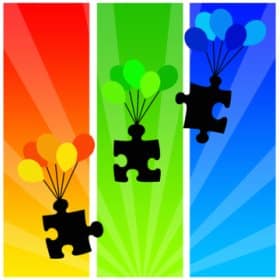One of the important things to do during the time of Midlife Transition is a LIFE REVIEW. It has been said that those who review their past in midlife are more certain of a successful transition to a healthy aging process. The following information (although it was created as an interview process for older adults) might be one way of beginning the process.
In other articles, I will be reviewing other methods of creating a life review. In the comments section below this article, please post your views on doing a review and/or suggestions on how you have done one.
This group of initial questions can be used in interviewing family members and is reprinted with permission from E. Rhoda Lewis and Dr. Phyllis Massing, professional interviewers and authors of “From Generation to Generation,” a practical guide that helps create family histories. However, for more information and a more complete set of questions, or to order their informative guide, call Life Stories / A Video Legacy, at 818-995-3315, P.O. Box 260436, Encino, CA 91426.
“Today is (Date) . I am ________________ and it is my pleasure to be interviewing ______________ my ______________ in her/his living room in (City) (State).
“Please tell me your full name, date of birth and place of birth.” “Who were you named after?”
Note: If the interviewee needs help with facts – state the information and then ask a question that does not require facts. This avoids having the interviewee feel self-conscious about memory lapses and alleviates the need to correct misinformation.
Suggested type of presentation in this situation: “You were born on September 28, 1920, in Atlanta. Your parents are Sam and Sonia Johnson who were married in Atlanta on September 30, 1918.”
Family
GREAT-GRANDPARENTS AND GRANDPARENTS
Names/Dates of Births/Dates of Deaths
Where they lived
Business they were in
Memories about them
How did they impact your life (favorite story)
MOTHER
Maiden name/Date and Place of Birth/Death
Where did she grow up?
What kind of person was she?
What kind of work did she do?
What is your favorite memory of her?
FATHER
Date and Place of Birth/Death
Where did he grow up
What kind of person was he?
What kind of work did he do?
Your favorite memory of him
How did your parents meet? Date of marriage
SIBLINGS
Names/Dates of Births and Death
A favorite story about each
Childhood
What were you like as a child?
Where did you live? (City & State)
What elementary school did you attend?
Were you a good student?
What is your favorite memory of school?
Teenage and Young Adult
TEENAGE YEARS
What high school did you attend?
What were you like as a teenager?
What is your most/least favorite story about high school?
What did you and your friends do for entertainment?
YOUNG ADULT YEARS
Where did you go to college? (Name and location)
What did you study?
What were your goals?
What is your most/least favorite story about college?
What was your first job out of college?
Where did you live?
Did it meet your expectations?
What else did you do?
Marriage and Family
When did you meet your spouse? Name/Date of Birth
When did you get married? Where/Date
Describe your wedding
Did your parents like your spouse?
Did her/his parents like you?
Where did you go on your honeymoon?
Where did you live?
What was your spouse’s business or profession?
CHILDREN
Names and Dates of Birth
What were they like as children
Favorite story about each
Describe your family life
Celebration of holidays (also, religious holidays)
Family vacations
Family reunions
CHILDREN AS ADULTS
Name of child/where does he/she live?
Work he/she does
Name of child’s spouse
Names of children and dates of birth
Favorite story about each child
Career
What has been your primary career?
What did you like best/least about it?
Would you do it again if you had a choice?
Retirement/Hobbies/Special Interests
What hobbies do you have?
Do you have friends who do the same thing?
Are you enjoying your retirement? How?
Reflections
What, if anything, would you have done differently?
Over time, how have you changed the way you look at life and people?
What would you especially like your children, grandchildren, and great-grandchildren to know and remember about you?
Is there anything you would like to add before we end?
“Thank you.”
© Copyright 2000, E. Rhoda Lewis and Phyllis Massing



